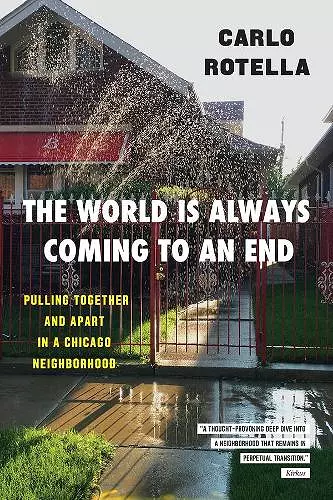The World Is Always Coming to an End
Pulling Together and Apart in a Chicago Neighborhood
Format:Paperback
Publisher:The University of Chicago Press
Published:28th Aug '20
Currently unavailable, and unfortunately no date known when it will be back

An urban neighborhood remakes itself every day--and unmakes itself, too. Houses and stores and streets define it in one way. But it's also people--the people who make it their home, some eagerly, others grudgingly. A neighborhood can thrive or it can decline, and neighbors move in and move out. Sometimes they stay but withdraw behind fences and burglar alarms. If a neighborhood becomes no longer a place of sociability and street life, but of privacy indoors and fearful distrust outdoors, is it still a neighborhood? In the late 1960s and 1970s Carlo Rotella grew up in Chicago's South Shore neighborhood--a place of neat bungalow blocks and desolate commercial strips, and sharp, sometimes painful social contrasts. In the decades since, the hollowing out of the middle class has left residents confronting--or avoiding--each other across an expanding gap that makes it ever harder for them to recognize each other as neighbors. Rotella tells the stories that reveal how that happened--stories of deindustrialization and street life; stories of gorgeous apartments with vistas onto Lake Michigan and of Section 8 housing vouchers held by the poor. At every turn, South Shore is a study in contrasts, shaped and reshaped over the past half-century by individual stories and larger waves of change that make it an exemplar of many American urban neighborhoods. Talking with current and former residents and looking carefully at the interactions of race and class, persistence and change, Rotella explores the tension between residents' deep investment of feeling and resources in the physical landscape of South Shore and their hesitation to make a similar commitment to the community of neighbors living there. Blending journalism, memoir, and archival research, The World Is Always Coming to an End uses the story of one American neighborhood to challenge our assumptions about what neighborhoods are, and to think anew about what they might be if we can bridge gaps and commit anew to the people who share them with us. Tomorrow is another ending.
"An ambitious analysis of a singular neighborhood that in some ways serves as a microcosm for all urban neighborhoods. . . . The author offers a nuanced narrative, partly personal and partly sociological, that keeps circling back to the same important truths about race, class, community, poverty, and crime. A thought-provoking deep dive into a neighborhood that remains in perpetual transition."--Eric Klinenberg "Kirkus" "An evocative and engaging mix of the minutely personal, the more broadly ethnographic, and the sociological in its description and analysis of a complex and interesting slice of Chicago. Rotella, who also works in long-form journalism, brings his gifts as a writer to bear on his experience of place and the terms of place itself."--Eric Klinenberg "Los Angeles Review of Books" "It's fair to call Rotella a poet of urban life, alive to the freedom that cities offer us to pursue lives of our own devising, and of masculinity and the ways men lose and find themselves in their passions."--Wendy Griswold, Northwestern University "National, on Playing in Time" "Some books take a while to draw you in. But when I'd finished the first paragraph of Carlo Rotella's The World Is Always Coming to an End: Pulling Together and Pulling Apart in a Chicago Neighborhood, I knew that I was going to love it." --John Wilson "Forma Review" "The World Is Always Coming to an End is unlike any work of contemporary urban studies that I know. It combines elements of journalism, archival research, ethnography, and memoir in a study of South Shore--the South Side, Chicago, neighborhood in which Carlo grew up, in the 1970s. It's at times lyrical, at times analytic, and always engaging."--Eric Klinenberg "Public Books"
ISBN: 9780226759616
Dimensions: 229mm x 152mm x 28mm
Weight: unknown
320 pages